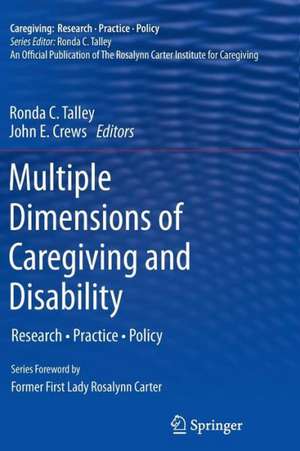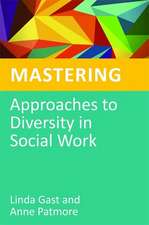Multiple Dimensions of Caregiving and Disability: Research, Practice, Policy: Caregiving: Research • Practice • Policy
Editat de Ronda C. Talley, John E. Crewsen Limba Engleză Paperback – 17 iul 2014
Multiple Dimensions of Caregiving and Disability addresses concerns that have been long familiar to the caregiver population and examines the current state of family care for individuals with disabilities. With a lifespan perspective, this concise reference reviews the literature on specific problems of caregivers and explores which care strategies are effective, promising, or lacking in available resources and support interventions. Contributors also explore the more fluid and subjective aspects of caregiving, such as feelings, spirituality, and family roles. Suggestions for future policy improvements, particularly within the public health sector, are discussed as well.
Topics covered include:
• Family dynamics and caregiving for people with disabilities.
• Parent caregiving of children with disabilities.
• Race, ethnicity, socioeconomic status, and caregiving.
• Educational, training, and support programs for caregivers.
• Emerging technologies to aid caregivers.
• Developing partnerships between caregivers and health care providers.
Multiple Dimensions of Caregiving and Disability is a must-have resource for researchers, scientist-practitioners, policy makers, and graduate students across such disciplines as clinicalpsychology, nursing, social work, public health, medicine, and social and education policy.
| Toate formatele și edițiile | Preț | Express |
|---|---|---|
| Paperback (1) | 1154.22 lei 6-8 săpt. | |
| Springer – 17 iul 2014 | 1154.22 lei 6-8 săpt. | |
| Hardback (1) | 1161.21 lei 6-8 săpt. | |
| Springer – 28 iun 2012 | 1161.21 lei 6-8 săpt. |
Preț: 1154.22 lei
Preț vechi: 1214.98 lei
-5% Nou
Puncte Express: 1731
Preț estimativ în valută:
220.85€ • 230.59$ • 182.79£
220.85€ • 230.59$ • 182.79£
Carte tipărită la comandă
Livrare economică 04-18 aprilie
Preluare comenzi: 021 569.72.76
Specificații
ISBN-13: 9781489999238
ISBN-10: 148999923X
Pagini: 236
Ilustrații: XVIII, 218 p.
Dimensiuni: 155 x 235 x 12 mm
Greutate: 0.34 kg
Ediția:2012
Editura: Springer
Colecția Springer
Seria Caregiving: Research • Practice • Policy
Locul publicării:New York, NY, United States
ISBN-10: 148999923X
Pagini: 236
Ilustrații: XVIII, 218 p.
Dimensiuni: 155 x 235 x 12 mm
Greutate: 0.34 kg
Ediția:2012
Editura: Springer
Colecția Springer
Seria Caregiving: Research • Practice • Policy
Locul publicării:New York, NY, United States
Public țintă
ResearchCuprins
1. Introduction: Multiple Dimensions of Caregiving and Disability.- 2. Family Dynamics and Caregiving for People with Disabilities.- 3. Feelings of Family Caregivers.- 4. Education, Training, and Support Programs for Caregivers of Individuals with Disabilities.- 5. Parent Caregivers of Children with Disabilities.- 6. Neither Prepared Nor Rehearsed: The Role of Public Health in Disability and Caregiving.- 7. Race/Ethnicity, Culture, and Socioeconomic Status and Caregiving of Persons with Disabilities.- 8. Faith and Spirituality: Supporting Caregivers of Individuals with Disabilities.- 9. Family Caregivers and Health Care Providers: Developing Partnerships for a Continuum of Care and Support.- 10. Legal Issues Related to Caregiving for an Individual with Disabilities.- 11. Long Term Care Planning For Individuals with Developmental Disabilities.- 12. Emerging Technologies for Caregivers of a Person with a Disability.- 13. Multiple Dimensions of Caregiving and Disability: Supporting Those Who Care.
Notă biografică
Ronda C. Talley, PhD, MPH, is Professor of Psychology at Western Kentucky University. Her prior work experience includes providing leadership on caregiving issues and organizational development as Executive Director of the Rosalynn Carter Institute for Caregiving and the National Quality Caregiving Coalition; working with national government groups to promote caregiving issues as Associate Director of Legislation, Policy, and Planning/Health Scientist for the Centers for Disease Control and Prevention, U.S. Department of Health and Human Services; and promoting the science and practice of psychology in the schools as Associate Executive Director of Education and Director of School Policy and Practice at the American Psychological Association. She chaired the National Organization of Pupil Services Organizations and the National Education Goals Panel Committee on Safe and Drug-free Schools. Dr. Talley has over 80 presentations and publications, including papers in the American Journal of Public Health and American Psychologist.
Dr. Talley, as Adjunct Associate Professor, taught ethics and legal issues in school psychology at the University of Maryland, College Park, and directed the School Psychology Program at Spalding University; she was Professor of Psychology and Education at Georgia Southwestern State University for five years. Dr. Talley directed the School Psychological Services Program in the Jefferson County (KY) Public Schools for a decade. She received the Outstanding Alumni Award from Indiana University and the Jack Bardon Distinguished Service Award from the Division of School Psychology of the American Psychological Association. Dr. Talley serves on the national board of the American Association of Caregiving Youth and is Editor-in-Chief of the Springer book series Caregiving: Research, Practice, and Policy.
John E. Crews, DPA, is a Health Scientist with the Vision Health Initiative in the Divisionof Diabetes Translation, National Center for Health Promotion and Disease Prevention, Centers for Disease Control and Prevention.
Dr. Crews has over thirty years of experience in vision rehabilitation and disability research. He managed a clinical program for older people with visual impairments in Michigan between 1977 and 1992. He then became the Acting Director of the Rehabilitation Research and Development Center on Aging at the Department of Veterans Affairs in Atlanta. After that, he served as the Executive Director of the Georgia Governor’s Council on Developmental Disabilities. In 1998, he joined the Centers for Disease Control and Prevention in Atlanta. Dr. Crews’ specialties are vision impairment and aging and caregiving and disability; his research interests also include health disparities among people with disabilities and aging with a disability.
Dr. Crews has over eighty publications, including recent papers in the American Journal of Public Health and the Annual Review of Public Health. His first book, Vision Loss in an Aging Society, was published in 2000; it was translated and published in Japan in 2003. He has entries in the Encyclopedia of Disability and the International Encyclopedia of Public Health. He currently serves on the Editorial Board of the Journal of Visual Impairment and Blindness, and he serves on the National Commission on Vision and Health. He was awarded the 2007 Distinguished Alumni Award from Western Michigan University.
Dr. Talley, as Adjunct Associate Professor, taught ethics and legal issues in school psychology at the University of Maryland, College Park, and directed the School Psychology Program at Spalding University; she was Professor of Psychology and Education at Georgia Southwestern State University for five years. Dr. Talley directed the School Psychological Services Program in the Jefferson County (KY) Public Schools for a decade. She received the Outstanding Alumni Award from Indiana University and the Jack Bardon Distinguished Service Award from the Division of School Psychology of the American Psychological Association. Dr. Talley serves on the national board of the American Association of Caregiving Youth and is Editor-in-Chief of the Springer book series Caregiving: Research, Practice, and Policy.
John E. Crews, DPA, is a Health Scientist with the Vision Health Initiative in the Divisionof Diabetes Translation, National Center for Health Promotion and Disease Prevention, Centers for Disease Control and Prevention.
Dr. Crews has over thirty years of experience in vision rehabilitation and disability research. He managed a clinical program for older people with visual impairments in Michigan between 1977 and 1992. He then became the Acting Director of the Rehabilitation Research and Development Center on Aging at the Department of Veterans Affairs in Atlanta. After that, he served as the Executive Director of the Georgia Governor’s Council on Developmental Disabilities. In 1998, he joined the Centers for Disease Control and Prevention in Atlanta. Dr. Crews’ specialties are vision impairment and aging and caregiving and disability; his research interests also include health disparities among people with disabilities and aging with a disability.
Dr. Crews has over eighty publications, including recent papers in the American Journal of Public Health and the Annual Review of Public Health. His first book, Vision Loss in an Aging Society, was published in 2000; it was translated and published in Japan in 2003. He has entries in the Encyclopedia of Disability and the International Encyclopedia of Public Health. He currently serves on the Editorial Board of the Journal of Visual Impairment and Blindness, and he serves on the National Commission on Vision and Health. He was awarded the 2007 Distinguished Alumni Award from Western Michigan University.
Textul de pe ultima copertă
Caring for people with disabilities often becomes an all-encompassing responsibility for one or more family members. To manage the multifaceted demands, caregivers must possess strong multitasking skills, including the ability to assist with daily life tasks; provide emotional support; help with financial affairs; mediate and advocate with health care providers. Maintaining balance within their own lives can become incredibly challenging for caregivers. More often than not, providing care for family members or loved ones occurs at the expense of the caregivers’ well-being. And for caregivers who themselves have disabilities, it further complicates matters.
Multiple Dimensions of Caregiving and Disability addresses concerns that have been long familiar to the caregiver population and examines the current state of family care for individuals with disabilities. With a lifespan perspective, this concise reference reviews the literature on specific problems of caregivers and explores which care strategies are effective, promising, or lacking in available resources and support interventions. Contributors also explore the more fluid and subjective aspects of caregiving, such as feelings, spirituality, and family roles. Suggestions for future policy improvements, particularly within the public health sector, are discussed as well.
Multiple Dimensions of Caregiving and Disability addresses concerns that have been long familiar to the caregiver population and examines the current state of family care for individuals with disabilities. With a lifespan perspective, this concise reference reviews the literature on specific problems of caregivers and explores which care strategies are effective, promising, or lacking in available resources and support interventions. Contributors also explore the more fluid and subjective aspects of caregiving, such as feelings, spirituality, and family roles. Suggestions for future policy improvements, particularly within the public health sector, are discussed as well.
Caracteristici
Provides a lifespan perspective on caregiving provided by family and friends Conceptualizes caregiving in context with environmental factors based on the International Classification of Functioning, Disability, and Health (ICF) framework Addresses the complex interaction between professional caregivers, family caregivers, and persons with disabilities Examines physical and mental health issues that affect caregivers? Includes supplementary material: sn.pub/extras

























